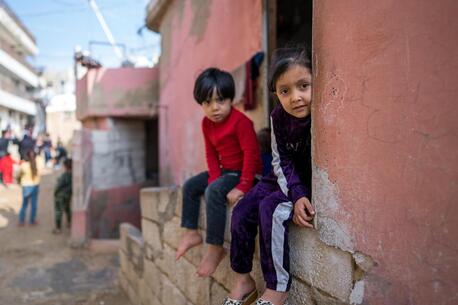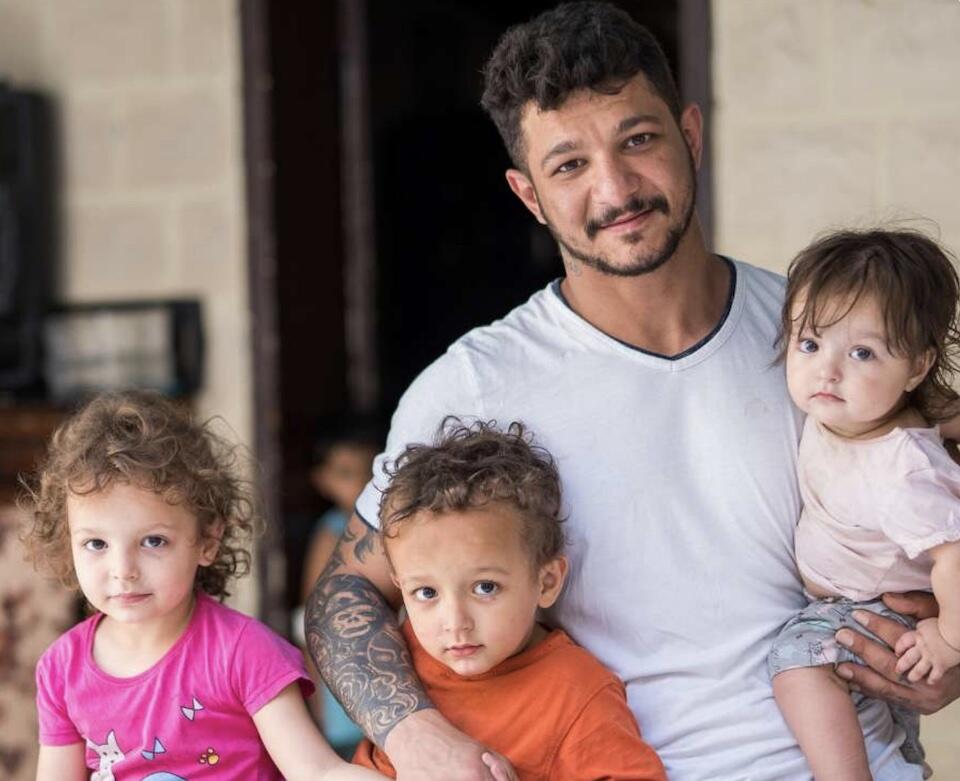
UNICEF in Lebanon
Conflict and other crises are threatening children in Lebanon. A look at what UNICEF is doing to support and protect the most vulnerable.
Lebanon: conflict and escalating humanitarian crises for children on multiple fronts
The situation for children in Lebanon has been steadily deteriorating for years as a result of a cascading series of political, economic and financial crises, the impacts of which have been unrelenting.
Hostilities at the southern border triggered an escalation in armed conflict in late September 2024, causing mass displacement of some 1.2 million people and exacerbating humanitarian needs across the board.

The physical and emotional toll of chronic deprivation and uncertainty, now compounded by severe damage to essential services and infrastructure, is endangering the nation's children and jeopardizing their futures.
Related: A Deepening Humanitarian Crisis for Children in the Middle East
A majority of children living in Lebanon lack essentials
Even before the escalation in conflict, families were are being pushed to the breaking point.
An overwhelming majority of households in Lebanon — more than 8 in 10 — have had to borrow money or use credit to buy essentials.
The number of children missing out on an education continues to rise, while a growing number of families are sending their children — some as young as 6 – to work.
Among Syrian refugees — an estimated 1 in 7 people in Lebanon are refugees, the highest per capita concentration of refugees in the world — the proportion of out-of-school children is over half.
“I just want my children to live their childhood, to play and learn,” one Lebanese father of three told UNICEF.
Poverty, conflict and the toll on children's mental health
Lebanon’s economic tailspin began in October 2019, after new tax measures prompted massive protests, the resignation of the cabinet and prime minister and a protracted political stalemate.
In August, 2020, a massive explosion in Beirut’s port killed over 200 people, injured more than 6,500 people and left 300,000 homeless. The COVID-19 pandemic further added to the strain.
Before the escalation in conflict, roughly 44 percent of the population in Lebanon were living in poverty, according to the World Bank. The vast majority of the estimated 1.5 million Syrian refugees, 23,000 Palestinian refugees from Syria and 180,000 Palestinian refugees living in Lebanon were living in extreme poverty. UNICEF expects poverty rates to increase as a result of conflict.
Conflict on top of economic pressures are taking a heavy toll on children's mental health.

How UNICEF is helping children and families in need in Lebanon
UNICEF has been on the ground in Lebanon for decades, working with partners to meet the urgent needs of children and families by providing a range of services and support across all major program areas. UNICEF is also scaling up emergency relief operations to mitigate the risks to children affected by escalating conflict.
"UNICEF teams are working around the clock to meet children’s needs from every angle," UNICEF Deputy Executive Director Ted Chaiban said. "From ensuring the flow of safe water to supplying shelters with sanitation kits, soap and shampoo. From linking the displaced to primary health care services to responding to the mental health concerns of children through play and psychosocial support activities. From tracing families to reunite lost children to delivering 167 tons of medical supplies to help pregnant women and injured children get the care they need."
Along with partner agency World Food Program, Chaiban added, "UNICEF is also organizing aid convoys that run into the hardest-to-reach areas with essential supplies for every child. But the scale of this crisis demands more."
Related: A Deepening Humanitarian Crisis for Children in the Middle East
Ongoing programming efforts in Lebanon include:
Health, immunization and nutrition
- supporting mental health and psychosocial support services for children and caregivers
- supporting the procurement of essential medications and medical supplies for primary health care centers, as well as stocking emergency health care supplies and equipment at health centers in southern Lebanon
- facilitating improved access to vaccination services to reach hundreds of thousands of children across the country with routine essential vaccines through mobile vaccination units
- equipping hundreds of primary health care centers with solar equipment and power supply — including solar fridges that safely store vaccines — to reduce costs and ensure immunization and essential services are not interrupted
- providing micronutrient supplements to improve nutrition for tens of thousands of children under age 5
- screening hundreds of thousands of children and providing treatment to acutely malnourished children
- offering nutrition counseling for caregivers of children under 5 in shelters and host communities in southern Lebanon
Water, sanitation and hygiene (WASH)
- rehabilitating multiple wastewater treatment plants
- supporting the repair and maintenance of water infrastructure
- helping to provide chlorine for water treatment to ensure safe drinking water supply across the country
- ensuring the availability of fuel to support uninterrupted water supply in the event of power outages in the south
- conducting emergency repairs on damaged water stations
Child protection and safeguarding children's rights
- supporting child protection services, including gender-based violence prevention and response
- partnering with the Ministry of Information and local media to protect children and adolescents from media risks and to advocate for their rights
- rolling out a child protection policy in education as a catalyst for violence-free schools; this calls for addressing situations of violence through early identification, and a functioning referral system, while protecting the privacy of students and their parents and caregivers
- engaging hundreds of religious leaders to strengthen their role in promoting and protecting children’s rights, applying UNICEF’s framework for social and behavioral change
- training hundreds of child justice-related professionals on children's rights in justice proceedings
- supporting hundreds of thousands of young people through volunteer and role model programs that promote and encourage positive behaviors, volunteerism, life skills, youth engagement and sustainable social change
- collaborating with the government of Lebanon to launch the country’s first-ever National Disability Allowance, together with the ILO, the EU and civil society groups
Education
- supporting public schools to facilitate student enrollment, via direct support and other funding for teacher salaries and parent councils
- training tens of thousands of teachers in learning recovery and addressing learning losses that stemmed from pandemic school closures
- enrolling hundreds of children with disabilities in public education and therapy sessions
- providing Cash for Education assistance to eligible families with children, including refugees and children with disabilities
- rehabilitating, constructing and upgrading public schools with solar power to save money and ensure a continuous supply of clean energy
- distributing essential school supplies and digital learning tools, as well as offering psychological support to children who have been displaced or whose schools have been closed
- providing incentives to educators in southern Lebanon to stay on the job
UNICEF remains at the forefront of the response to multiple crises impacting all children in Lebanon, regardless of nationality.
Increased donor support can help scale assistance programs and reach the most vulnerable children and families in need.
"The daily suffering of children must stop,” said UNICEF Representative in Lebanon, Edouard Beigbeder. "We must redouble our efforts to make sure every child is in school and learning, is protected from physical and mental harm and has the opportunity to thrive and contribute to society."
Unrestricted donations give UNICEF the flexibility to direct resources wherever they are needed most. Your contribution can make a difference. Donate today.



